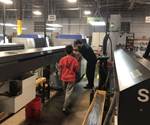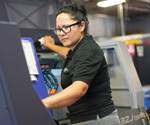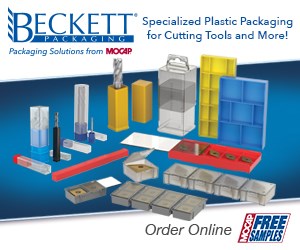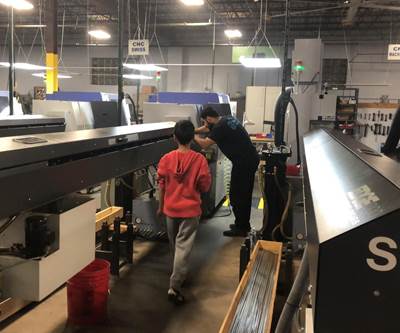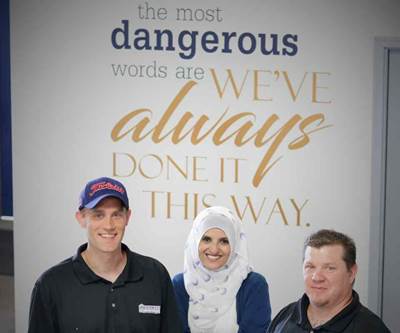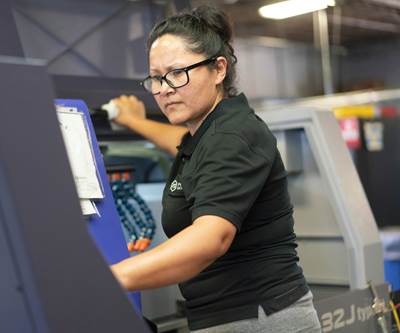Women Advocacy: Empowering Without Dividing
Promoting the manufacturing industry to all groups, especially young women, will help close the skilled labor gap.
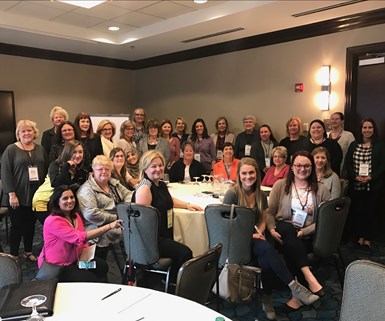
What a difference a year makes! Over 40 women attended the PMPA Management Update Conference 2017. In 2016, we had less than 10. Amazing what happens when they realize they won't be "the only" woman present! Photo credit: PMPA Staff
As manufacturing leaders and business owners, we have a responsibility to promote the industry to groups that often aren’t naturally inclined to choose manufacturing as their career. This extends to Generation Z, grade school students and young women who, in particular, represent one of the largest reservoirs of untapped talent.
The more attractive we make our industry to young women, the more success we will have closing the labor gap. From the outside looking in, it’s still a male-dominated industry where men outnumber women by more than three to one. Compared to 30 years ago, when women were almost unheard of in the industry, it’s clear we’re trending in the right direction. Some see this progress and ask if manufacturing still needs groups that focus exclusively on women and their accomplishments.
It’s a reasonable question. With respect to Rosie the Riveter, our industry owes much of its success to the men that paved the way. If women want a bigger slice, why not just earn it?
I agree. Women, just like men, absolutely must continue to earn their place in the industry. Victimhood is not a success plan. I mentor both men and women, and my advice is the same regardless of gender: Exceed expectations. There are no shortcuts for sustainable success. Go beyond the scope of your job description, show that you care, and the world will take notice.
Nationwide, women represent 47% of the workforce across all industries. In manufacturing, however, women account for only 29%. Generation Z is on the verge of entering that workforce. The sting of the last recession’s layoffs still lingers, and it’s on us to give these young women reasons to push through the discomfort of being outnumbered.
We have a place for you in manufacturing. If you work hard, you and the industry will prosper together.
Organizations and events that celebrate women and their contributions to the industry serve this very purpose. Our intention is to inspire and recruit, not divide or score points on some political agenda, and the message is this: “We have a place for you in manufacturing. If you work hard, you and the industry will prosper together.”
These groups allow women to share their challenges, setbacks and lessons learned along the way. Men are welcome at these events, and some take the stage to share their best practices. This empowers our youth, providing a support network to young women who might otherwise reconsider their choice of profession. It also allows newcomers to witness women being respected by their colleagues and giving recognition to others that paved their way. Often these “others” are fathers, uncles, and brothers that welcomed them into the industry, and for that we are grateful!
However, naysayers exist, and sometimes they push back. For example, I recently visited a robotics team at a local high school. There was precisely one girl on the team, who I’ll call Amy. Amy held a leadership position with multiple roles. She was a senior, but it was only her first year on the team. When I asked her about it, Amy said she was just thankful the boys accepted her this year. She had tried joining the previous year, but it was clear that she was unwelcome. If any of her teammates were on her side, they stayed silent. Amy left the team, and kept the cause to herself because she “didn’t want to be a snitch.” Amy didn’t want to be a “glass ceiling breaker” or start a revolution. She just wanted harmony so she could contribute.
Fortunately for Amy and robotics, she rejoined the following year and the boys were more accepting. Yet for every “Amy,” how many promising women are looking elsewhere after encountering that vocal minority of naysayers? I have yet to speak to a woman in manufacturing who can’t relate several stories of toxic behavior. Personally, I’m comfortable in a room full of men. The same cannot always be said of young women on the precipice of manufacturing, whether a robotics team, manufacturing floor or conference room.
Like boys, girls need mentors who inspire as well as educate. Women come with knowledge and skills, and ultimately they must learn to believe in themselves if they are to succeed. The ultimate goal is no longer needing these groups because women blend right in.
To get there, the next generation of women manufacturers need both men and women to lift them up.
To get there, the next generation of women manufacturers need both men and women to lift them up. Men have much to teach. Many men understand that closing the labor gap and propelling growth means recruiting more women, and they’re eager to share their hard-won knowledge. Women mentors also have this knowledge, but also enjoy the unfair advantage of actually being a prominent, successful woman in manufacturing.
These successful women have a responsibility to give back to the industry. The conversation about women should always serve as a gateway into the greater discussion of diversity. “Male bashing” is counterproductive. If we have a seat at the table, it’s on us to represent the industry in the best possible way and break barriers for everyone regardless of their ethnicity, background, age or gender.
Finally, women-specific awards and groups serve as powerful recruiting tools. The general public tends to view manufacturing as even more skewed toward men. Some of this “general public” are brilliant and motivated grade school girls, as well as their parents and peers. By visibly promoting women, we arm these girls with confidence against words of discouragement, whether from a rival or a loved one.
These success stories and role models empower young women to push through self-doubt. Some of them only need that one conversation or experience to open their eyes to all that manufacturing can offer them. The American dream is alive and kicking in our industry. It’s up to us to show it to them.
About the Author
Aneesa Muthana
Aneesa Muthana is co-owner and President of Pioneer Service, a Certified Women-Owned Small Business contract manufacturer specializing in Swiss precision parts, CNC turned parts, and centerless grinding services in Addison, Illinois. Email amuthana@pioneerserviceinc.com or visit www.pioneerserviceinc.com.
Read Next
A Place in Manufacturing Should Be Earned, Not Given
How do your children fit into your succession plan?
Read MoreAttributes of Manufacturing Leaders, Not Just Managers
A machine shop owner shares six attributes that good shop leaders have.
Read MoreWe Belong Here: Women in Manufacturing Share Their Stories
Three women—a young welder, an experienced machinist/setup person and a shop owner—share what it is like to be a woman in a manufacturing career and illustrate that a more inclusive workforce helps our manufacturing industry thrive.
Read More
